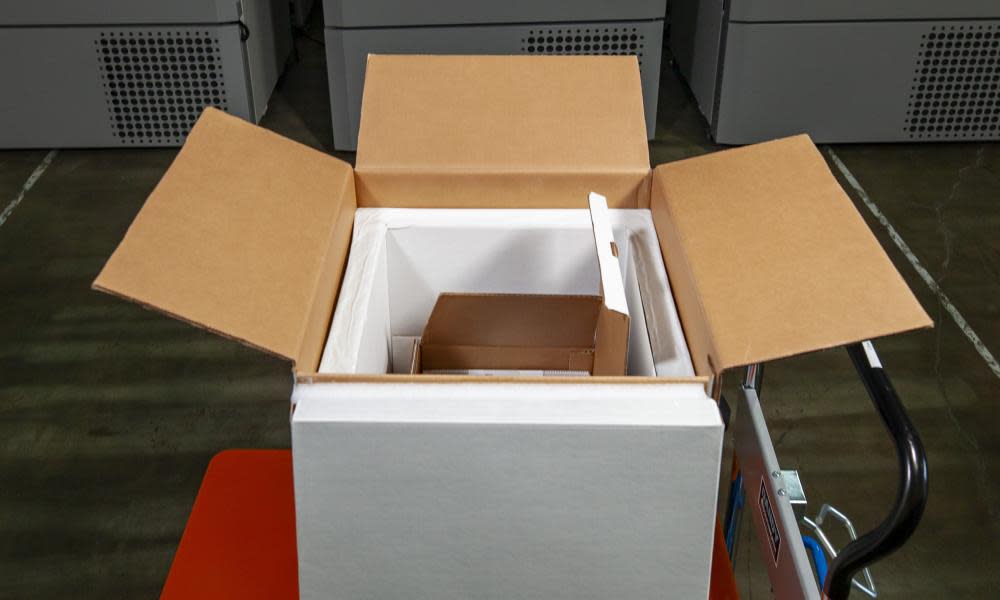When and how will I be able to get a Covid vaccine in the UK?

Now that the UK has authorised the first Covid vaccine, who will get it first?
The government’s Joint Committee on Vaccination and Immunisation (JCVI) says its priority is to prevent Covid-related deaths and protect health and social care staff and systems.
Elderly care home residents and their carers are first on the JCVI’s list because their risk of exposure to the virus is higher and because the risk of death closely correlates with older age. They are followed in priority by anyone else over 80 and frontline health and social care workers.
Even so, for pragmatic reasons NHS staff are likely to be the first group to receive the Pfizer/BioNTech jab. This is because the vaccine needs to be stored at ultra-cold temperatures, which can be achieved more easily by using hospital facilities, and because of limits on the number of times the vaccine can be moved. The NHS has been told to prepare for the first doses to be given as early as next week.
Are there enough doses to reach all the priority groups?
Together, care home residents, their carers and the over-80s make up nearly 6 million people, and frontline NHS staff a further 736,685. Matt Hancock, the health secretary, has said he expects 10m doses of the Pfizer/BioNTech vaccine to be available this year, so if this is the only vaccine authorised, everyone else would have to wait until further doses become available next year. However, other vaccines are also expected to be approved in the coming weeks and months, including the Oxford/AstraZeneca vaccine.
Next on the JCVI priority list are all those aged 75 and over, followed by the over-70s, and clinically extremely vulnerable individuals (those who were told to shield during the early stages of the pandemic).
They will be followed by all those aged 65 and over; anyone aged 16 to 64 with underlying health conditions that put them at higher risk; those aged 60 and over; 55 and over; and 50 and over. Together, these groups are estimated to account for 99% of preventable deaths from Covid-19.
The second phase of vaccination is likely to target those at higher risk of occupational exposure and/or delivering key public services, including teachers and transport workers, followed by everyone else.
Should I contact my GP/pharmacist?
No. Particularly while Covid cases remain high, it is important that people don’t make unnecessary journeys to their GP surgery or place extra demand on phone services such as NHS 111. The NHS will contact people individually once it is their turn to be vaccinated and provide full details of where they should go and what they need to do in order to receive the vaccine.
Where will I go for the vaccine?
Covid-19 vaccines are expected to be delivered at three types of venue: NHS trust “vaccine hubs” at hospital sites; mass vaccination centres, which are in the process of being set up at places such as football stadiums, conference buildings and racecourses – these are expected to vaccinate up to 5,000 people a day; and at GP surgeries and pharmacies. GPs can also visit care home residents and housebound patients at home without them needing to travel.
Which vaccine will be distributed at each centre is unclear, but given the freezer requirements of the Pfizer/BioNTech jab, it is unlikely this will be used at the mass vaccination centres or GP surgeries/pharmacies, at least initially. The Oxford/AstraZeneca vaccine would be easier to deliver at these sites, assuming it is approved.
Who will administer it?
The NHS is overseeing the mass vaccination programme, with GPs and others given training to handle and administer the new jab, including retired doctors, pharmacists, district nurses, health visitors and physiotherapists.
Those from outside the NHS who are being targeted for recruitment as vaccinators include airline cabin crew, firefighters and people who are unemployed. They will be paid £11.20 an hour, according to an internal NHS briefing paper.
How far apart will the two doses be administered, and will I protected after the first?
While there is some evidence to indicate high levels of short-term protection from a single dose of vaccine, a two-dose schedule is what has been approved by the Medicines and Healthcare products Regulatory Agency (MHRA).
The second dose will need to be delivered at least 21 days after the first, and both will be injected into the deltoid muscle – the thick triangular muscle we use to raise each arm.
For the Pfizer vaccine, its efficacy rate was calculated seven days after the second shot. It is likely that people will have some protection before this, but this is how long it will take for full protection to kick in. We will learn more about the extent of protection and how long it lasts as data from ongoing clinical trials comes in.
Can I pay to get the vaccine privately?
Unlikely. England’s deputy chief medical officer, Jonathan Van-Tam, has said he believes Covid-19 vaccines should be delivered according to clinical priority rather than allowing people to jump the queue if they can afford it.
Although manufacturers could choose to sell their vaccines to private suppliers, Pfizer has said its focus is on delivering the vaccine to the NHS, in line with its agreement with the government.
Will I be able to choose which vaccine I have?
Also unlikely, at least in the short to medium term. Assuming more than one vaccine is approved, the priority will be distributing any available doses to the people who need it as quickly as possible. Other vaccines may become available at different times, but these won’t necessarily be delivered at the same locations, owing to the different storage requirements and shelf lives of the various vaccines. So even if you were allowed to pick and choose, alternatives may not be available.

 Yahoo Movies
Yahoo Movies 
